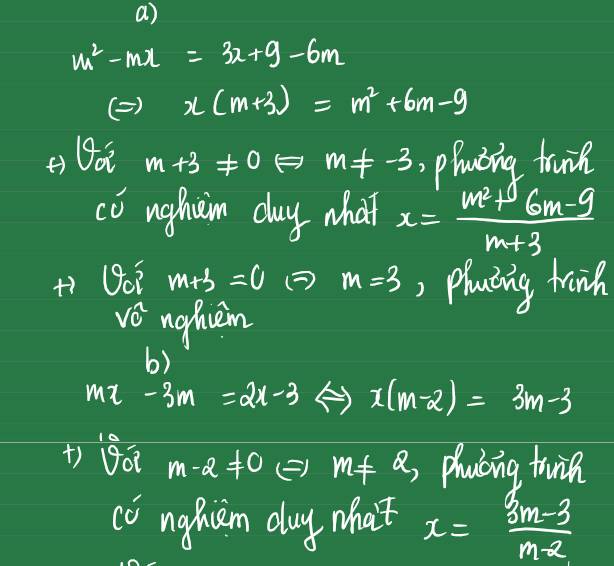Cho phương trình 9 x - 2 ( 2 m + 1 ) 3 x + 3 ( 4 m - 1 ) = 0 có hai nghiệm thực x 1 , x 2 thỏa mãn ( x 1 + 2 ) x 2 + 2 = 12 . Giá trị của m thuộc khoảng
![]()
![]()
![]()
![]()
bài 9 các cặp phương trình sau có tương đương hay không?
d, x+2=0 và \(\dfrac{x}{x+2}=0\)
bài 8 cho phương trình (m\(^2\)-9)x-3=m. Giải phương trình trong các trường hợp sau:
a,m=2 b,m=3 c,m=-3
Bài 9:
Không, vì $x+2=0$ có nghiệm duy nhất $x=-2$ còn $\frac{x}{x+2}=0$ ngay từ đầu đkxđ đã là $x\neq -2$ (cả 2 pt không có cùng tập nghiệm)
Bài 8:
a. Khi $m=2$ thì pt trở thành:
$(2^2-9)x-3=2$
$\Leftrightarrow -5x-3=2$
$\Leftrightarrow -5x=5$
$\Leftrightarrow x=-1$
b.
Khi $m=3$ thì pt trở thành:
$(3^2-9)x-3=3$
$\Leftrightarrow 0x-3=3$
$\Leftrightarrow 0=6$ (vô lý)
c. Khi $m=3$ thì pt trở thành:
$[(-3)^2-9]x-3=-3$
$\Leftrightarrow 0x-3=-3$ (luôn đúng với mọi $x\in\mathbb{R}$)
Vậy pt vô số nghiệm thực.
a) \(2\left(x^2-2x\right)+\sqrt{x^2-2x-3}-9=0\)
b) \(3\sqrt{2+x}-6\sqrt{2-x}+4\sqrt{4-x^2}=10-3x\)
c) Cho phương trình: \(\sqrt{x}+\sqrt{9-x}=\sqrt{-x^2+9x+m}\)
+) Giải phương trình khi m=9
+) Tìm m để phương trình có nghiệm
a, ĐK: \(x\le-1,x\ge3\)
\(pt\Leftrightarrow2\left(x^2-2x-3\right)+\sqrt{x^2-2x-3}-3=0\)
\(\Leftrightarrow\left(2\sqrt{x^2-2x-3}+3\right).\left(\sqrt{x^2-2x-3}-1\right)=0\)
\(\Leftrightarrow\left[{}\begin{matrix}\sqrt{x^2-2x-3}=-\dfrac{3}{2}\left(l\right)\\\sqrt{x^2-2x-3}=1\end{matrix}\right.\)
\(\Leftrightarrow x^2-2x-3=1\)
\(\Leftrightarrow x^2-2x-4=0\)
\(\Leftrightarrow x=1\pm\sqrt{5}\left(tm\right)\)
b, ĐK: \(-2\le x\le2\)
Đặt \(\sqrt{2+x}-2\sqrt{2-x}=t\Rightarrow t^2=10-3x-4\sqrt{4-x^2}\)
Khi đó phương trình tương đương:
\(3t-t^2=0\)
\(\Leftrightarrow\left[{}\begin{matrix}t=0\\t=3\end{matrix}\right.\)
\(\Leftrightarrow\left[{}\begin{matrix}\sqrt{2+x}-2\sqrt{2-x}=0\\\sqrt{2+x}-2\sqrt{2-x}=3\end{matrix}\right.\)
\(\Leftrightarrow\left[{}\begin{matrix}2+x=8-4x\\2+x=17-4x+12\sqrt{2-x}\end{matrix}\right.\)
\(\Leftrightarrow\left[{}\begin{matrix}x=\dfrac{6}{5}\left(tm\right)\\5x-15=12\sqrt{2-x}\left(1\right)\end{matrix}\right.\)
Vì \(-2\le x\le2\Rightarrow5x-15< 0\Rightarrow\left(1\right)\) vô nghiệm
Vậy phương trình đã cho có nghiệm \(x=\dfrac{6}{5}\)
c, ĐK: \(0\le x\le9\)
Đặt \(\sqrt{9x-x^2}=t\left(0\le t\le\dfrac{9}{2}\right)\)
\(pt\Leftrightarrow9+2\sqrt{9x-x^2}=-x^2+9x+m\)
\(\Leftrightarrow-\left(-x^2+9x\right)+2\sqrt{9x-x^2}+9=m\)
\(\Leftrightarrow-t^2+2t+9=m\)
Khi \(m=9,pt\Leftrightarrow-t^2+2t=0\Leftrightarrow\left[{}\begin{matrix}t=0\\t=2\end{matrix}\right.\Leftrightarrow\left[{}\begin{matrix}9x-x^2=0\\9x-x^2=4\end{matrix}\right.\Leftrightarrow\left[{}\begin{matrix}x=0\left(tm\right)\\x=9\left(tm\right)\\x=\dfrac{9\pm\sqrt{65}}{2}\left(tm\right)\end{matrix}\right.\)
Phương trình đã cho có nghiệm khi phương trình \(m=f\left(t\right)=-t^2+2t+9\) có nghiệm
\(\Leftrightarrow minf\left(t\right)\le m\le maxf\left(t\right)\)
\(\Leftrightarrow-\dfrac{9}{4}\le m\le10\)
cho phương trình ẩn x sau :(m-3)x+m^2 -9=0(1) a, giải phương trình với m=2 b,Tìm m để phương trình (1) có nghiệm duy nhất .Tìm nghiệm duy nhất đó
mk cảm ơn trước nha
a: Khi m=2 thì pt sẽ là \(-x-5=0\)
hay x=-5
b: Để phương trình có nghiệm duy nhất thì m-3<>0
hay m<>3
Bài 1:Cho biểu thức P=√x + 1/√x - 2 + 2√x/√x +2 + 2+5√x /4-x
a)Rút gọn P
b)Tìm x để P=2
Bài 2:Cho hệ phương trình x+my=9 và mx-3y=4
a)Giải hệ phương trình với m=3
b)Tìm m để hệ phương trính có nghiệm x=-1,y=3
Bài 1:
a) Ta có: \(P=\dfrac{\sqrt{x}+1}{\sqrt{x}-2}+\dfrac{2\sqrt{x}}{\sqrt{x}+2}+\dfrac{2+5\sqrt{x}}{4-x}\)
\(=\dfrac{\left(\sqrt{x}+1\right)\left(\sqrt{x}+2\right)}{\left(\sqrt{x}-2\right)\cdot\left(\sqrt{x}+2\right)}+\dfrac{2\sqrt{x}\left(\sqrt{x}-2\right)}{\left(\sqrt{x}+2\right)\left(\sqrt{x}-2\right)}-\dfrac{2+5\sqrt{x}}{\left(\sqrt{x}+2\right)\left(\sqrt{x}-2\right)}\)
\(=\dfrac{x+3\sqrt{x}+2+2x-4\sqrt{x}-2-5\sqrt{x}}{\left(\sqrt{x}-2\right)\left(\sqrt{x}+2\right)}\)
\(=\dfrac{3x-6\sqrt{x}}{\left(\sqrt{x}-2\right)\left(\sqrt{x}+2\right)}\)
\(=\dfrac{3\sqrt{x}\left(\sqrt{x}-2\right)}{\left(\sqrt{x}-2\right)\left(\sqrt{x}+2\right)}\)
\(=\dfrac{3\sqrt{x}}{\sqrt{x}+2}\)
b)
ĐKXĐ: \(\left\{{}\begin{matrix}x\ge0\\x\ne4\end{matrix}\right.\)
Để P=2 thì \(\dfrac{3\sqrt{x}}{\sqrt{x}+2}=2\)
\(\Leftrightarrow3\sqrt{x}=2\left(\sqrt{x}+2\right)\)
\(\Leftrightarrow3\sqrt{x}=2\sqrt{x}+4\)
\(\Leftrightarrow3\sqrt{x}-2\sqrt{x}=4\)
\(\Leftrightarrow\sqrt{x}=4\)
hay x=16(nhận)
Vậy: Để P=2 thì x=16
2.
a, \(m=3\), hệ phương trình trở thành:
\(\left\{{}\begin{matrix}x+3y=9\\3x-3y=4\end{matrix}\right.\)
\(\Leftrightarrow\left\{{}\begin{matrix}4x=13\\y=\dfrac{3x-4}{3}\end{matrix}\right.\)
\(\Leftrightarrow\left\{{}\begin{matrix}x=\dfrac{13}{4}\\y=\dfrac{23}{12}\end{matrix}\right.\)
b, \(\left(x;y\right)=\left(-1;3\right)\) là nghiệm của hệ, suy ra:
\(\left\{{}\begin{matrix}-1+3m=9\\-m-9=4\end{matrix}\right.\)
\(\Leftrightarrow\left\{{}\begin{matrix}m=\dfrac{10}{3}\\m=-13\end{matrix}\right.\)
\(\Rightarrow\) Không tồn tại giá trị m thỏa mãn
Bài 1: Giải và biện luận các phương trình sau:
a) m(m-x)= 3(x+3)-6m
b) mx-3m=2x-3
c) (m^2 -9)x=m^2 +3m
Bài 2: Giải và biện luận các phương trình sau:
a) m(m-1)=2(2x+1)
b) (m^2 - 9)x=m^2 +3m
c) m(m-1)= 2(4-x)
d) (m^2 -3m+2)x= m-2
Các cậu giúp tớ với ạ, không cần làm hết đâu ạ, mng biết câu nào thì làm hộ tớ với nhé, plss!
Vì hai bài giống nhau nên anh sẽ làm mẫu bài 1 nhé.

Bài 5: Cho phương trình: 2(m ^ 2 - 9) * x + m - 3 = 0
a)Giải phương trình khi m=4
b)Tìm m để phương trình nghiệm đúng với mọi x
a) m = 4 thì PT trở thành:
\(2.\left(4^2-9\right)x+4-3=0\)
\(\Leftrightarrow10x+1=0\)
\(\Leftrightarrow x=-\dfrac{1}{10}\)
Vậy PT có nghiệm \(x=-\dfrac{1}{10}\)
b) Đặt nghiệm của PT là \(x_0\)
\(\Rightarrow2\left(m^2-9\right)x_0+m-3=\forall x_0\)
\(\Leftrightarrow2\left(m-3\right)\left(m+3\right)x_0+m-3=0\forall x_0\)
\(\Leftrightarrow\left[2\left(m+3\right)+x_0\right]\left(m-3\right)=0\forall x_0\)
\(\Rightarrow m-3=0\\ \Leftrightarrow m=3\)
Vậy m = 3 thì phương trình nghiệm đúng với mọi x
bài 1: giải các phương trình sau :
a) x^3-5x=0 b) căn bậc 2 của x-1=3
bài 2 :
cho hệ phương trình : {2x+my;3x-y=0 (I)
a) giải hệ phương trình khi m=0
b) tìm giá trị của m để hệ (I) có nghiệm (x;y) thỏa mãn hệ thức :
x-y+m+1/m-2=-4
bài 3:giải các phương trình sau
a)5x-2/3=5x-3/2 b) 10x+3/12=1+6x+8/9 c) 2(x+3/5)=5-(13/5+x) d) 7/8x-5(x-9)=20x+1,5/6
Cho phương trình \(x^2-3x+2m-1=0\). Tìm \(m\) để phương trình có 2 nghiệm \(x_1\), \(x_2\) thỏa mãn \(x_1^3-x_2^3+3x_1x_2=9\).
GIÚP MÌNH VỚI :))
1) Cho phương trình: 2x2 - ( 2m + 1 ) x + m2 - 9m + 39 = 0
a. Giải phương trình khi m=9
b. Tìm m để phương trình có 2 nghiệm phân biệt
2) Cho phương trình: x2 - 2 (m - 1) x -3 - m =0
a. Giải phương trình khi m=-1
b) Tìm m để phương trình có 2 nghiệm phân biệt
cho phương trình \(x^2-6\left(m-1\right)x+9\left(m-3\right)=0\left(1\right)\)
a, giải phương trình (1) khi m=2
b, tìm các giá trị của m để phương trình (1) có 2 nghiệm phân biệt thoả mãn \(x_1+x_2=2x_1.x_2\)
a. Khi m=2 thì (1) có dạng :
\(x^2-6\left(2-1\right)x+9\left(2-3\right)=0\\ \Leftrightarrow x^2-6x-9=0\\ \Leftrightarrow\left(x-3\right)^2=18\Leftrightarrow x-3=\pm\sqrt{18}\\ \Leftrightarrow x=3\pm3\sqrt{2}\)
Vậy với m=2 thì tập nghiệm của phương trình là \(S=\left\{3\pm3\sqrt{2}\right\}\)
b. Coi (1) là phương trình bậc 2 ẩn x , ta có:
\(\text{Δ}'=\left(-3m+3\right)^2-1\cdot9\left(m-3\right)=9m^2-18m+9-9m+27\\ =9m^2-27m+36=\left(3m-\dfrac{9}{2}\right)^2+\dfrac{63}{4}>0\)
Nên phương trình (1) luôn có 2 nghiệm x1,x2 thỏa mãn:
\(\left\{{}\begin{matrix}x_1+x_2=6\left(m-1\right)\\x_1x_2=9\left(m-3\right)\end{matrix}\right.\left(2\right)\)
Vì
\(x_1+x_2=2x_1x_2\\ \Leftrightarrow6\left(m-1\right)=18\left(m-3\right)\Leftrightarrow m-1=3m-9\\ \Leftrightarrow2m=8\Leftrightarrow m=4\)
Vậy m=4
b) Ta có: \(\text{Δ}=\left[-6\left(m-1\right)\right]^2-4\cdot1\cdot9\left(m-3\right)\)
\(=\left(6m-6\right)^2-36\left(m-3\right)\)
\(=36m^2-72m+36-36m+108\)
\(=36m^2-108m+144\)
\(=\left(6m\right)^2-2\cdot6m\cdot9+81+63\)
\(=\left(6m-9\right)^2+63>0\forall m\)
Suy ra: Phương trình luôn có hai nghiệm phân biệt với mọi m
Áp dụng hệ thức Vi-et, ta có:
\(\left\{{}\begin{matrix}x_1+x_2=6\left(m-1\right)=6m-6\\x_1\cdot x_2=9\left(m-3\right)=9m-27\end{matrix}\right.\)
Ta có: \(x_1+x_2=2x_1\cdot x_2\)
\(\Leftrightarrow6m-6=2\left(9m-27\right)\)
\(\Leftrightarrow6m-6-18m+54=0\)
\(\Leftrightarrow-12m+48=0\)
\(\Leftrightarrow-12m=-48\)
hay m=4
Vậy: m=4